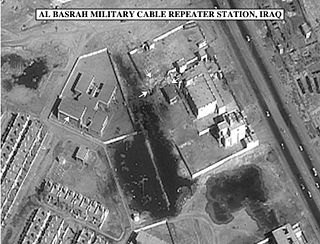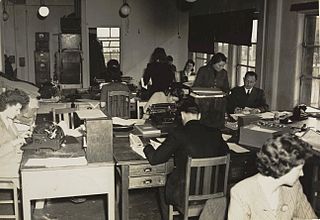 W
WBomb damage assessment (BDA), also known as battle damage assessment, is the practice of assessing damage inflicted on a target from a stand-off weapon, most typically a bomb or air launched missile. It is part of the larger discipline of combat assessment. Assessment is performed using many techniques including footage from in-weapon cameras, gun cameras, forces on the ground near the target, satellite imagery and follow-up visits to the target. Preventing information on battle damage reaching the enemy is a key objective of military censorship. For nuclear weapons special techniques may be required due to the extensive damage caused and difficulty in approaching the site.
 W
WBritish Security Co-ordination (BSC) was a covert organisation set up in New York City by the British Secret Intelligence Service (MI6) in May 1940 upon the authorisation of the Prime Minister, Winston Churchill.
 W
WThe Bureau Bijzondere Opdrachten was a Dutch secret service during World War II. The BBO dispatched secret agents to the German-occupied Netherlands, where they supported the local resistance and carried out sabotage activities.
 W
WCamp 020 at Latchmere House in south London was a British interrogation centre for captured German agents during the Second World War. It was run by Lieutenant Colonel Robin "Tin Eye" Stephens. Although other wartime interrogation centres were alleged to have used torture to extract confessions, Stephens denied claims that torture had been used at Camp 020. His instructions for interrogators ordered: “Never strike a man. In the first place it is an act of cowardice. In the second place, it is not intelligent. A prisoner will lie to avoid further punishment and everything he says thereafter will be based on a false premise.”
 W
WThe OSS Deer Team was established by the United States Office of Strategic Services on May 16, 1945 to attack and intercept materials on the railroad from Hanoi in central Vietnam to Lạng Sơn in northeast Vietnam with the hope of keeping Japanese military units from entering China. They sent intelligence reports to OSS agents stationed in China. The team provided training, medical and logistical assistance to Hồ Chí Minh and the Việt Minh in 1945.
 W
WThe Kenpeitai was the military police arm of the Imperial Japanese Army from 1881 to 1945. It was both a conventional military police and a secret police force. In Japanese-occupied territories, the kenpeitai also arrested or killed those who were suspected of being anti-Japanese. While it was institutionally part of the army, the Kenpeitai also discharged the functions of the military police for the Imperial Japanese Navy under the direction of the Admiralty Minister, those of the executive police under the direction of the Home Minister and those of the judicial police under the direction of the Justice Minister. A member of the corps was called a kenpei (憲兵).
 W
WMain Intelligence Directorate, abbreviated GRU, was the foreign military intelligence agency of the Soviet Army General Staff of the Soviet Union until 1991 and for a brief few months the foreign military intelligence agency of the newly established Russian Federation until it was deactivated on 7 May 1992 and replaced with the G.U. on the same day.
 W
WThe Security Service, also known as MI5, is the United Kingdom's domestic counter-intelligence and security agency and is part of its intelligence machinery alongside the Secret Intelligence Service (MI6), Government Communications Headquarters (GCHQ) and Defence Intelligence (DI). MI5 is directed by the Joint Intelligence Committee (JIC), and the service is bound by the Security Service Act 1989. The service is directed to protect British parliamentary democracy and economic interests, and counter terrorism and espionage within the UK.
 W
WThe Military Intelligence Service was a World War II U.S. military unit consisting of two branches, the Japanese American unit described here and the German-Austrian unit based at Camp Ritchie, described partly in Ritchie Boys. The unit described here was primarily composed of Nisei who were trained as linguists. Graduates of the MIS language school (MISLS) were attached to other military units to provide translation, interpretation, and interrogation services.
 W
WThe Netherlands Indies Government Information Service (NIGIS) was a civil secret service and propaganda organisation based in Australia, during and after World War II.
 W
WThe Office of Strategic Services (OSS) was a wartime intelligence agency of the United States during World War II, and a predecessor to the Department of State's Bureau of Intelligence and Research (INR) and the Central Intelligence Agency (CIA). The OSS was formed as an agency of the Joint Chiefs of Staff (JCS) to coordinate espionage activities behind enemy lines for all branches of the United States Armed Forces. Other OSS functions included the use of propaganda, subversion, and post-war planning. On December 14, 2016, the organization was collectively honored with a Congressional Gold Medal.
 W
WSMERSH was an umbrella organization for three independent counter-intelligence agencies in the Red Army formed in late 1942 or even earlier, but officially announced only on 14 April 1943. The name SMERSH was coined by Joseph Stalin. The main reason for its creation was to subvert the attempts by German forces to infiltrate the Red Army on the Eastern Front.